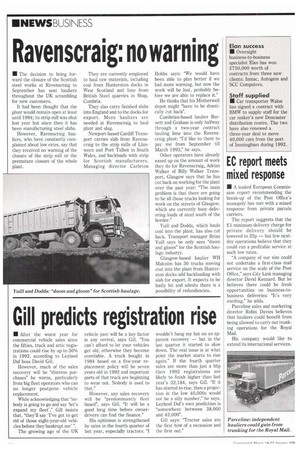Gill predicts registration rise
Page 12

If you've noticed an error in this article please click here to report it so we can fix it.
• After the worst year for commercial vehicle sales since the fifties, truck and artic registrations could rise by up to 30% in 1992, according to Leyland Dal boss David Gill.
However, much of the sales recovery will be "distress purchases" he warns, particularly from big fleet operators who can no longer postpone vehicle replacement.
While acknowledging that "nobody is going to go and say 'let's expand my fleet'," Gill insists that, "they'll say 'I've got to get rid of those eight-year-old vehicles before they bankrupt me' ".
The growing age of the UK vehicle parc will be a key factor in any revival, says Gill. "You can't afford to let your vehicles get old, otherwise they become unreliable. A truck bought in 1984 based on a five-year replacement policy will be seven years old in 1992 and important parts of that truck are beginning to wear out. Nobody is used to that."
However, any sales recovery will be "predominantly fleet based", says Gill. "It will be a good long time before ownerdrivers can find the finance."
His optimism is strengthened by sales in the fourth quarter of last year, especially tractors: "I wouldn't hang my hat on an apparent recovery — but in the last quarter it started to slow down. The real issue is at what point the market starts to rise again," If the fourth quarter sales are more than just a blip then 1992 registrations are likely to finish higher than last year's 32,184, says Gill. "If it has started to rise, then a projection in the low 40,000s would not be a silly number," he says. Leyland Daf's own prediction is "somewhere between 38,000 and 42,000".
Gill says: 'Tractor sales are the first hint of a recession and the first out."




















































































